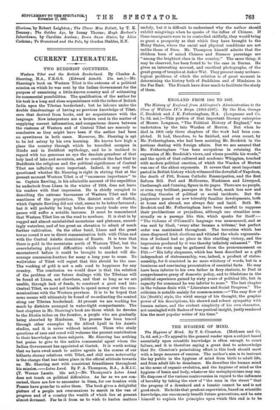ENGLAND FROM 1801 TO 1837.
The History of England from Addington's Administration to the Close of William IV.'s Reign (1801-1837). By the Hon. George C. Brodrick and J. K. Fotheringham, M.A. (Longmans and Co. 7s. 6d. net.)—This portion of that important literary enterprise of Messrs. Longman, "The Political History of England," was undertaken by the late Warden of Merton. But when he died in 1903 only three chapters of the work had been com- pleted. It had, therefore, to be finished, and even recast, by Mr. Fotheringham, who had been assisting Mr. Brodrick in the portions dealing with foreign affairs. But we are assured that Mr. Fotheringham "has been scrupulous in retaining the expression of Mr. Brodrick's views, and where possible his words," and the spirit of that cultured and academic Whiggism, touched with modern political emotion, of which the Warden of Merton was one of the ablest exponents. It covers that most important period in British history which witnessed the downfall of Napoleon, the death of Pitt, Roman Catholic Emancipation, and the first Reform Bill. Peel and Melbourne, Huskisson and Liverpool, Castlereagh and Canning, figure in its pages. There are no purple, or even very brilliant, passages in the book, much less new and startling theories of political or social incidents. But the judgments passed on now tolerably familiar developments, both at home and abroad, are always fair and lucid. Both Mr. Brodrick and Mr. Fotheringham have been careful to suppress their predilections or prejudices, although one stumbles occa- sionally on a passage like this, which speaks for itself:— "The violence of O'Connell's language was unmeasured, and as was said by Sheil, ' every altar became a tribune,' but perfect order was maintained throughout. The terrorism which has since disgraced Irish elections and vitiated the whole representa- tion of Ireland had no place in this startling victory, and the impression produced by it was thereby infinitely enhanced." The tone of the work may be gathered from the pronouncement on Pitt :—" His lofty eloquence, which has been described as a gift independent of statesmanship, was, indeed, a product of states- manship, for it consisted in no mere witchery of words, but in a luminous and convincing presentation of essential facts. He may have been inferior to his own father in fiery rhetoric, to Peel in comprehensive grasp of domestic policy, and to Gladstone in the political experience gained by sixty years of political life, but in capacity for command he was inferior to none." The last chapter in the volume deals with " Literature and Social Progress." The criticism is notable mainly for common-sense :—" The easy flow of his [Scott's] style, the vivid energy of his thought, the graphic power of his descriptions, his shrewd and robust sympathy with human nature, and the evident simplicity of his own character, not unmingled with flashes of true poetical insight, justly rendered him the most popular writer of his time."


























































 Previous page
Previous page